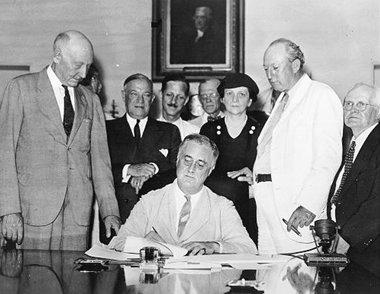
[[H I S T O R Y]] * Seventy years ago today--August 14, 1935--U.S. President Franklin D. Roosevelt put his signature to the Social Security Act of 1935 (pictured above). Described variously as one of the greatest humanitarian programs in American history, and as FDR’s most enduring legacy, the Act became law at the height of the Great Depression (1929-1939), and was integral to Roosevelt’s “New Deal” package of economic reforms. It created a federal government system to provide old-age retirement benefits and short-term financial compensation for the unemployed, all financed by a payroll tax on employers and employees. As Roosevelt said at the signing ceremony:
This law represents a cornerstone in a structure which is being built but is by no means completed--a structure intended to lessen the force of possible future depressions, to act as a protection to future administrations of the Government against the necessity of going deeply into debt to furnish relief to the needy--a law to flatten out the peaks and valleys of deflation and of inflation--in other words, a law that will take care of human needs and at the same time provide for the United States an economic structure of vastly greater soundness.Social Security was introduced in the aftermath of the U.S. Supreme Court’s decision striking down the National Industrial Recovery Act of 1933, which had “called on business to draw up codes to ensure fair competition and provide for collective bargaining, maximum hours, and minimum wages for the poor,” as Jules Witcover explains in Party of the People: A History of the Democrats. (The Court contended that the NIRA handed legislative powers over to the executive branch at the expense of states’ authority.) Long before then, Roosevelt had told his labor secretary, Frances Perkins, that every American “from the cradle to the grave ... ought to be in a social insurance system.” Social Security, though its goals were pared down amid fervid opposition from Republicans (who, like former President Herbert Hoover, preached “individual responsibility” in place of government assistance), was the initial step in that direction, with further social reforms to come as part of President Lyndon Johnson’s “Great Society” agenda. Though it has been expanded and tinkered with over the decades, the system has remained an essential “part of the American economic fabric,” as newspaper columnist Helen Thomas writes. U.S. Representative John T. Salazar (D-Colorado) noted yesterday in the Democratic Party’s weekly radio address to the nation that “Social Security has never failed to pay a promised benefit to seniors or people with disabilities--it has never been a day late or a dollar short.”
According to Social Security commissioner Jo Anne B. Barnhart, the system “has paid approximately $8.4 trillion in benefits to nearly 200 million people” since its inception in 1935. In 2005 alone, $518 billion in Social Security benefits will go out to more than 48 million Americans. In a column in today’s Washington Post, Michelle Singletary quotes figures provided by the Center on Budget and Policy Priorities, a liberal think tank, showing that “without Social Security benefits, 46.8 percent of Americans age 65 and older would have incomes below the poverty line. About 13 million elderly Americans are lifted out of poverty by these benefits.” Joe Conason, who writes for both Salon and the New York Observer (and has a new book scheduled for publication in October, The Raw Deal: How the Bush Republicans Plan to Destroy Social Security and the Legacy of the New Deal), opined in Big Lies (2003) that Social Security “embodies American values of community and fairness” better than almost any other U.S. government program.
Previous Social Security anniversaries have engendered greater enthusiasm from Washington, D.C., than this one has. In 1985, for instance, when Republican Ronald Reagan (at one time a Democrat and FDR supporter) was
 still sitting in the White House, the Chicago Tribune reported that “Administration officials, surrounded by pictures of the bleak conditions of the Depression era, ... marked the 50th anniversary of the Social Security system by defending the program’s success. Martha McSteen, acting commissioner of the Social Security Administration, insisted that Social Security ‘serves all people of this country and it serves them well.’”
still sitting in the White House, the Chicago Tribune reported that “Administration officials, surrounded by pictures of the bleak conditions of the Depression era, ... marked the 50th anniversary of the Social Security system by defending the program’s success. Martha McSteen, acting commissioner of the Social Security Administration, insisted that Social Security ‘serves all people of this country and it serves them well.’”This year, however, with George W. Bush still flogging his unpopular prescription to partially privatize the system, and deliberately frightening citizens with his bogus contention that Social Security faces imminent fiscal crisis, we can expect no such high-level commemorations. Even as today brings 131 events nationwide celebrating Social Security’s anniversary, the Post reports, “Bush administration officials are ... fanning out this weekend to make the case that the nation can best honor the program by accepting the president’s prescriptions for its future”--even though Republicans concede that present proposals along those lines would do little to extend the system’s solvency, and are fraught with political risks. What the future of Social Security holds is still anyone’s guess. But former Clinton advisor and columnist Sidney Blumenthal is already giving last rites to Bush’s privatization scheme. As he wrote earlier this year in Salon, the prez’s impending defeat “is no minor affair. He has made this the centerpiece of domestic policy of his second term. It is the decades-long culmination of the conservative wing’s hostility against Social Security and the Democratic Party. Projecting images of Roosevelt and Kennedy cannot distract from Bush’s intent to undermine the accomplishments of Democratic presidents. The repudiation of Bush on Social Security will be fundamental and profound and will shake the foundations of conservative Republicanism. Bush’s agony is only beginning, if the Democrats in the Senate can maintain their discipline.”
Unfortunately, in this tug of war between the powerful legacy of Roosevelt and the partisan deceptions of Bush, many folks may fail to recognize the invaluable impact Social Security has had on reshaping and settling American life. Maybe in another 10 years, when an able Democrat is again sitting in the Oval Office, the system will receive the praise it deserves.
READ MORE: “Social Security Lessons,” by Paul Krugman
(The New York Times).
ADDENDUM: More bad news for Dubya? In a Sunday New York Times column titled, “Someone Tell the President the War Is Over,” Frank Rich--citing tumbling public approval ratings for Bush’s handling of the bloody Iraq conflict--contends that “What lies ahead now in Iraq instead is not victory, which Mr. Bush has never clearly defined anyway, but an exit (or triage) strategy that may echo Johnson’s March 1968 plan for retreat from Vietnam ... The [United States] has already made the decision for Mr. Bush. We’re outta there. Now comes the hard task of identifying the leaders who can pick up the pieces of the fiasco that has made us more vulnerable, not less, to the terrorists who struck us four years ago next month.”
Meanwhile, the Associated Press notes that Bush enjoys a much lower standing with the American public at this point in his presidency than did either of his most recent two-term predecessors. By this same stage, Reagan’s approval stood at 57 percent; Bill Clinton’s was at 61 percent. By comparison, the latest AP-Ipsos poll showed Bush with a 42 percent approval rating. As one public opinion analyst says, “This president should be glad he’s not running for re-election.”







No comments:
Post a Comment